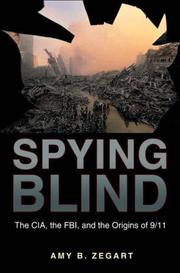| Listing 1 - 1 of 1 |
Sort by
|

ISBN: 9780691120218 0691120218 0691141037 9786612158056 1282158058 1400830273 9781400830275 9780691141039 9780691141039 Year: 2009 Publisher: Princeton, NJ
Abstract | Keywords | Export | Availability | Bookmark
 Loading...
Loading...Choose an application
- Reference Manager
- EndNote
- RefWorks (Direct export to RefWorks)
In this pathbreaking book, Amy Zegart provides the first scholarly examination of the intelligence failures that preceded September 11. Until now, those failures have been attributed largely to individual mistakes. But Zegart shows how and why the intelligence system itself left us vulnerable. Zegart argues that after the Cold War ended, the CIA and FBI failed to adapt to the rise of terrorism. She makes the case by conducting painstaking analysis of more than three hundred intelligence reform recommendations and tracing the history of CIA and FBI counterterrorism efforts from 1991 to 2001, drawing extensively from declassified government documents and interviews with more than seventy high-ranking government officials. She finds that political leaders were well aware of the emerging terrorist danger and the urgent need for intelligence reform, but failed to achieve the changes they sought. The same forces that have stymied intelligence reform for decades are to blame: resistance inside U.S. intelligence agencies, the rational interests of politicians and career bureaucrats, and core aspects of our democracy such as the fragmented structure of the federal government. Ultimately failures of adaptation led to failures of performance. Zegart reveals how longstanding organizational weaknesses left unaddressed during the 1990's prevented the CIA and FBI from capitalizing on twenty-three opportunities to disrupt the September 11 plot. Spying Blind is a sobering account of why two of America's most important intelligence agencies failed to adjust to new threats after the Cold War, and why they are unlikely to adapt in the future.
Intelligence service --- September 11 Terrorist Attacks, 2001. --- Terrorism --- Government policy --- United States. --- TerrorismGovernment policyUnited States. --- 9/11 Terrorist Attacks, 2001 --- 911 Terrorist Attacks, 2001 --- Attack on America, 2001 (September 11 Terrorist Attacks) --- Nine-Eleven Terrorist Attacks, 2001 --- Pentagon-World Trade Center Terrorist Attacks, 2001 --- Sept. 11 Terrorist Attacks, 2001 --- September 11 Terror Attacks, 2001 --- September 11 Terrorism, 2001 --- Terrorist Attacks, September 11, 2001 --- World Trade Center-Pentagon Terrorist Attacks, 2001 --- FBI --- FBR --- Federal Bureau of Investigation (U.S.) --- Federalʹnoe bi︠u︡ro rassledovaniĭ v SShA --- Agjencia Qendrore e Inteligjencës --- Central Intelligence Agency (U.S.) --- CIA (Central Intelligence Agency (U.S.)) --- CIP (United States. Centrālās izlūkošanas pārvalde) --- Mei-kuo chung yang chʻing pao chü --- National Security Council (U.S.). --- Si Aing Ei --- T︠S︡entralʹnoe razvedyvatelʹnoe upravlenie SShA --- T︠S︡RU SShA --- T︠S︡RU (T︠S︡entralʹnoe razvedyvatelʹnoe upravlenie SShA) --- ЦРУ США --- ЦРУ (Центральное разведывательное управление США) --- Центральное разведывательное управление США --- ארצות הברית. --- 美國. --- Hijacking of aircraft --- National Security Council (U.S.) --- CIA (Central Intelligence Agency) --- BPB2211 --- Comité permanent de Contrôle des services de renseignement et de sécurité (Comité permanent R) --- Vast Comité van Toezicht op de inlichtingen- en veiligheidsdiensten (Vast Comité I)
| Listing 1 - 1 of 1 |
Sort by
|

 Search
Search Feedback
Feedback About UniCat
About UniCat  Help
Help News
News